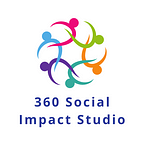Diversity, Equity, and Inclusion (DEI) Are Not Fads! The Future of DEI in Nonprofits — Conversation Recap — May 27th, 2021
Hey Futurists!
This week’s discussion was truly inspirational. We both have spent a decent amount of time on Clubhouse in spaces where black and brown voices have led discussions around race + equity, but so many of the discussions have been focused (rightfully so) on the here and now. While both Jayden Aubryn (they/them) and KJ Williams (no pronouns) are clearly experts in their respective fields and asserted powerful voices to deepen the conversation around DEI on the whole, it was fascinating to hear both of them talk about their visions for the future. That is why we are both filled with gratitude for the time and sense of community that they helped bring to our club’s conversation this week!
“Now, we are uniquely positioned as a society to facilitate the kind of change that has never happened before in this country. We now have this incredible opportunity to facilitate healing and when those who are at the helm of these organizations wake up and really wake up and recognize that and collectively come together to strategize and to center people and be focused on race so that we can create a more equitable landscape, we will not only see healing and growth, but we will see transformation and innovation. We will see creativity and we all will experience a level of hope that people have lost because of all the death, and all the pain that we continue to experience.” — KJ Williams, RiseWithKJ
Front and center in that discussion was trauma. With nonprofits, in particular, our organizations work with people affected by trauma. Our organizations are staffed and led by people who have been affected by trauma. This is something that can so easily be overlooked, dismissed, and/or forgotten, especially by those who have more privilege within our organizations (which, unfortunately, tends to be those in positions of power). Jayden and KJ both emphasized that the future of DEI efforts rests in how we look inwards into our organizations and seek to support our community from a trauma-informed perspective to increase equity.
“You know I’m biased…I am a therapist and I really think there is going to be a merging of the ideas of trauma-informed care and racial equity together. I think what that really means and looks like, well its going down and saying, okay, someone’s being harmed, you’re experiencing something, you’re having a reaction. What is going on there? And when we facilitate difficult conversations, whether it be from trauma, from anxiety, from bias, from microaggressions, whatever is happening…Let’s lean into these difficult conversations and start to heal as a community.” — Jayden Aubryn, Traverse Therapy & King County Equity Cabinet
The other thing we both took away from the room was the idea that you have the power to “change the space that you occupy.” As discussed by KJ, this idea is rooted in the reality that you CAN and DO have the power to change and influence any space that you occupy! The future of DEI is dependent upon the courage of individuals to challenge the status quo and have courageous conversations. As Jayden emphasized, the future is not necessarily certain. While the events of the past year have moved us closer to the ‘tipping point’, we will not realize true equity, inclusion, and justice without persistence and courage. In closing, let us always remember that everyone has both the power to change the space that you occupy, as well as the ability to change what we can touch and touch what we can change!
In keeping with our mission to continue to share knowledge and resources that we have found helpful in our own work, you can find this week’s free resources in our Nonprofit Futurist’s PUBLIC Google Drive folder. This week, our resource is the Washington Race, Equity, and Justice Initiative (REJI) Organizational Race Equity Toolkit. See you next week!
Yours in Community,
Chandler Lewis and Chad Wolver
Founders & Co-Hosts
Nonprofit Futurists Club — Clubhouse
______________________________________________________________
Join us on Thursday @ 4:55 pm PST on #Clubhouse to talk with us about Nonprofit Board Governance. Link 👉Board Governance and How to Get It Right!
______________________________________________________________
About Chandler Lewis (he/him/his)
Chandler Lewis is a nonprofit leader and the Executive Director of a 501(c)3 organization called Circle of Friends for Mental Health. Chandler also works full-time as a Project Manager for Kauffman & Associates, an American Indian– and woman-owned management consulting firm dedicated to improving the lives of vulnerable populations and enhancing the reach and effectiveness of social sector organizations. Chandler’s passion is working with young innovators and research teams and he serves as a Mentor for several notable organizations within the Seattle innovation ecosystem including: University of Washington’s Foster School of Business — Masters of Science in Entrepreneurship Program, UW CoMotion Advisory Solutions, CoMotion Labs and the Husky Leadership Initiative.
About Chad Wolver (he/him/his)
Chad is the Founder of Azul Analysis, which is a social enterprise that created the first-ever nonprofit-specific automated financial dashboard software to help organizations tell a more comprehensive financial story. Learn more at www.azulanalysis.com. His connection to the nonprofit sector stems from his time spent in South Africa with the Peace Corps and several other international nonprofit organizations. He currently lives in Phoenix, AZ, and sits on several boards and councils including ASU Lodestar Leadership Council, Arizona Community Foundation LGBTQ Council, ONE Community Advisory Board, and several Phoenix Community Alliance Committees.
